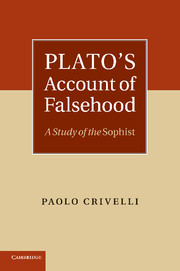Book contents
- Frontmatter
- Contents
- Acknowledgements
- Abbreviations of titles of Plato's works
- Note on the text
- Introduction
- Chapter 1 The sophist defined
- Chapter 2 Puzzles about not-being
- Chapter 3 Puzzles about being
- Chapter 4 The communion of kinds
- Chapter 5 Negation and not-being
- Chapter 6 Sentences, false sentences, and false belief
- Appendix The Sophist on true and false sentences
- References
- Index of names
- Index of subjects
- Index of passages cited
- References
Chapter 4 - The communion of kinds
Published online by Cambridge University Press: 05 February 2012
- Frontmatter
- Contents
- Acknowledgements
- Abbreviations of titles of Plato's works
- Note on the text
- Introduction
- Chapter 1 The sophist defined
- Chapter 2 Puzzles about not-being
- Chapter 3 Puzzles about being
- Chapter 4 The communion of kinds
- Chapter 5 Negation and not-being
- Chapter 6 Sentences, false sentences, and false belief
- Appendix The Sophist on true and false sentences
- References
- Index of names
- Index of subjects
- Index of passages cited
- References
Summary
So far the core part of the Sophist has accumulated puzzles and difficulties. At 251a5 Plato signals that the turning point has been reached: henceforth he will endeavour to offer solutions. The present chapter follows the first steps of Plato's attempted solutions. It comprises seven sections.
Section 4.1 deals with the puzzles of the late-learners. Surprisingly enough, the constructive part of the Sophist opens with further difficulties. The late-learners believe that a name can be truly applied to a thing only if it fully expresses that thing's essence. They therefore forbid us to apply many names to the same perceptible particular (by saying something like ‘This is a man and is good’) and permit only sentences that fully describe the essence of a kind (e.g. ‘Man is a man’ and ‘Goodness is good’). Section 4.2 is about the reply to the late-learners, which is based on an argument to the effect that some different kinds combine with one another while others do not. Dialectic is described as the science that studies which kinds combine with one another and the plan is sketched of carrying out a sample study of the combination of kinds. The Visitor and Theaetetus concentrate on three kinds: being, change, and stability. The remark that each of them is identical to itself and different from the other two prompts the question whether identity and difference are two further kinds. Sections 4.3, 4.4, and 4.5 are about the arguments which establish that identity and difference are indeed two further kinds. These arguments are extremely compressed and have sparked exegetical debates. Section 4.6 focuses on the portion of the dialogue where the Visitor and Theaetetus return to the project of examining the combination of kinds: no longer of three, as they originally planned, but of five, since it has become clear that identity and difference are two more kinds over and above being, change, and stability. This leads to an examination of four pairs of sentences concerning change. Some of these pairs of sentences (e.g. ‘Change is not identical’–‘Change is identical’) seem inconsistent. They are not, however, genuinely inconsistent because in uttering them ‘we are not speaking likewise’. Section 4.7 deals with the passage where the Visitor and Theaetetus cash in an important result of their discussion: since the kind being itself is different from all other kinds, it can be described as ‘not being’ in certain ways.
- Type
- Chapter
- Information
- Plato's Account of FalsehoodA Study of the Sophist, pp. 102 - 176Publisher: Cambridge University PressPrint publication year: 2011



